- Home
- Mark Wayne McGinnis
The Simpleton: An Alien Encounter
The Simpleton: An Alien Encounter Read online
the simpleton
… An Alien Encounter
Written By
Mark Wayne McGinnis
Contents
Title Page
Prologue
Chapter 1
Chapter 2
Chapter 3
Chapter 4
Chapter 5
Chapter 6
Chapter 7
Chapter 8
Chapter 9
Chapter 10
Chapter 11
Chapter 12
Chapter 13
Chapter 14
Chapter 15
Chapter 16
Chapter 17
Chapter 18
Chapter 19
Chapter 20
Chapter 21
Chapter 22
Chapter 23
Chapter 24
Chapter 25
Chapter 26
Chapter 27
Chapter 28
Chapter 29
Chapter 30
Chapter 31
Chapter 32
Chapter 33
Chapter 34
Chapter 35
Chapter 36
Chapter 37
Chapter 38
Chapter 39
Chapter 40
Chapter 41
Chapter 42
Chapter 43
Chapter 44
Chapter 45
Chapter 46
Chapter 47
Chapter 48
Chapter 49
Epilogue
Acknowledgments
Other books by MWM
Copyright
Prologue
Cuddy Perkins stopped suddenly in his tracks and stared blankly at the tall line of trees before him. He tried to recall how he’d gotten there, but knew his forgetfulness was not out of the ordinary—nothing to be concerned about. He continued on, reveling in the enveloping coolness of the forest. He’d entered his favorite place in the whole world. A magical place. It made sense now—that he’d be here. He continued forward, allowing his hands to slide across the rough bark on two opposing stout tree trunks. Trees he neither knew the names of, nor particularly cared to know.
Though he knew deep down he’d walked there many times before, still, something strange was going on. He turned his attention to his feet. As he stepped—first with his left foot, then with his right—he carefully watched his size 13 Keds. Yup … they felt funny. He made a face—tightened his lips while squeezing his eyelids tightly shut. It was his I’m so stupid face. Bending over, Cuddy used his thumb to rub off some caked-on mud to expose the section of rubber where his toes were. He rubbed some more but the arrow still wasn’t there. Then, using the same thumb, he wiped the other shoe and, sure enough, there it was! The arrow Momma had drawn with a Sharpie. He’d put his shoes on the wrong feet again. Weighing the hassle of taking them off then putting them on the right foot it would be way too much trouble.
Cuddy continued on, walking ever deeper into the woods, still feeling somewhat out of sorts. He briefly wondered if he were dreaming. His dreams, so vivid, often seemed more real than when he was wide awake. And where is Rufus? Glancing back, he already knew he wouldn’t see his dog there. “Rufus!” he called out anyway into the shadows behind him.
The sound of trickling water helped orient him to his present whereabouts. Hurrying up his pace, Cuddy caught the glimmering reflection of the sun in the little creek ahead. When he leapt over the water, landing on the opposite bank, his shoes sunk into the mud and gave a sucking sound when he pulled them free. As he continued walking alongside the winding brook, he was mostly content with life.
For the second time that day, Cuddy stopped suddenly in his tracks, uncertain if he was awake or dreaming. In any event, he was pretty certain that what he was seeing, sitting there up on a rock, was indeed an angel. The fact that this particular brightly glowing spectacle wasn’t wearing any clothes did seem quite odd, but, there again, he wasn’t sure what angels were supposed to wear—or look like.
A breeze cooled Cuddy’s face, carrying along with it the musky fragrance coming off the nearby brook. Momma had talked about such things in the past, sometimes when she read to him before bedtime. Things like heaven. And angels. Sometimes Cuddy would dream of the things she’d read to him about.
Standing up, the angel was nearly as tall as Cuddy was—over six feet tall. Cuddy remained perfectly still—he held his breath. Suddenly, the angel looked around, as if he’d detected another presence. A rabbit ran into view and just as quickly disappeared into a nearby thicket. The angel stared after the critter for a while—then, slowly he walked away—going deeper into the woods.
Cuddy felt a chill run up and down his back. He wished he’d worn his sweatshirt and that he’d wake up from this strange dream.
Chapter 1
(click icon above to view 3D diagram)
More and more of late, Tow had a tendency to be cynical. He already knew that. It wasn’t news to him. Soweng’s dying words, two months past, had told him as much. She’d said, “Don’t you see the irony, Tow? Of those who still see the promise of things to come … a future for our kind … one that is better than the past … it is you who will become, after everything we’ve endured together, the one … the final torch holder.” She coughed and blood appeared at the corners of her mouth. Her smile was genuine and her eyes misty—her fate so tragically sealed many months before. As Tow held her in his arms, she reached up a hand and gently touched the side of his face. “… stay the course … take us home.”
She died then. Not five minutes later, or two minutes later, but right then. Tow wondered if she’d known how he felt about her? That he’d loved her ever since the first time he watched her walk, more like glide, onto the Evermore’s bridge, three years ago.
An audible alarm tone began to reverberate throughout the ship. “We’re being shadowed, Captain Tow,” the AI orb said. “It is one of the three Howsh vessels.”
His gaze snapped away from the forward observation window and the view out to open space. He looked expectantly to the empty captain’s chair. With renewed urgency, he strode to the other side of the bridge to check the helmsman readings. His heart sank; this was not how it was supposed to be—the captain dead, the helmsman dead. Everyone dead. Loneliness pressed in around him—an avalanche of lonely despair. How could he continue on alone? He wondered, for the hundredth time, if he was up to the task—its sheer enormity weighing on him.
Back at the forward station, he found his drink and brought the half-filled cup of xicachan nervously up to his lips. A good portion of the lukewarm stimulant sloshed down his chin and onto the controls in front of him. He badly needed to relieve himself. Attempting to stand, he instantly was reminded his left leg was injured during his most recent clash with the Howsh.
White-hot searing pain shot up his leg—spikes starting in his foot and ending in his upper thigh. Pounding on his leg with a clenched fist wasn’t helping any, so he waited a moment for the pain to subside before awkwardly hobbling out from the oppressive bridge. Hesitating, something occurred to him: it just might work … He glanced over to one of the unmanned consoles, mentally willing an environmental system’s configuration menu to download, and it immediately popped into view, six feet away.
Tow raised a hand, distantly manipulating the virtual menu settings. Immediately, the ship’s gravity generators reconfigured, and he felt the heavy weight on his leg subside somewhat. Feeling new relief, he thought, why didn’t I think to do that before?
Tow ceased limping his way toward the ship’s stern and turned back toward the bridge. “How close are they?” he asked, speaking aloud into the empty com
partment.
“Within seven hundred twenty million clicks,” the anthropomorphic voice came back. The AI orb then appeared around a partial bulkhead. Seventeen inches long and eleven inches tall, the orb was shaped like an elongated sphere. Black as obsidian, the orb was the AI’s singular outer connection with the physical world. It silently hovered nearby. At the sphere’s apex was a concave circular section, an aperture of sorts, from which a faint blue light emanated—the orb’s ever-watchful eye. Its opposing ends had two mechanical articulating arms—each with four finger-like appendages.
Tow weighed his strong urge to urinate against saving an entire species from extinction. He grudgingly hobbled back toward the bridge. Hurrying, he miscalculated the effects from resetting the gravity generators and found himself bicycling his legs—now being nearly weightless—two feet off the deck.
“Now seven hundred and five million clicks.”
Tow didn’t reply, waiting for his body to slowly drop down, and to again feel solid decking beneath his feet. By the time he reentered the bridge, taking the same seat he’d extricated himself from only moments before, he could see the cloaked outline of the trailing vessel on the virtual viewscape display, off to his left. After grabbing ahold of opposing diagonal corners, he pulled the virtual display—making it larger. He leaned forward to study the image.
“Yes … that is the same one that fired on us before!” he said aloud.
“I suspect they have been there all along, Captain Tow. It was well cloaked.”
Tow still felt uncomfortable being called captain. A position he’d risen to by default—not because he’d earned it. Looking at the viewscape, he felt the familiar churning in his stomach as sour bile rose, burning the back of his throat. What he was feeling now was beyond fear—beyond anger—beyond hatred; only the natural instinct to survive remained, transcending all other emotions and propelling him forward.
“Now, six hundred and eighty-five million clicks,” the AI updated, its bucolic tone grating, as usual, on Tow’s nerves.
He chewed on the inside of his cheek, while continuing to stare at the viewscape display, and briefly wondered what the captain would do in the same situation but then thought better of it. Doing things the way the captain once did could very well get him where the captain was—dead.
“Now, six hundred and sixty-five million clicks,” the AI orb said.
“Do you know how annoying that is, AI?” Tow asked.
The AI orb then descended several feet, not responding.
“We have only a matter of hours, if even that, Captain Tow. The enemy’s vessels are closing in on us fast.”
“I know, I know, just tell me where the closest Class-A analogous sister planet is.”
The AI went silent, checking.
As far as Tow knew, all worlds within the universe had a certain number of analogous sister planets. It only made sense. Out of the trillions of heavenly bodies encompassing the cosmos, there were only a select few matching a Class-A’s pre-defined criteria, including such specifics as atmospheric conditions—a correlation of nitrogen and oxygen. While nitrogen needed to be between 75% and 80% of the total atmosphere, oxygen needed to be between 20% and 24%. The remaining percentage mainly consisted of argon. The size and weight of a sister world directly corresponded to its gravitational properties. Then there was the amount of water available—ice formations, lakes, and oceans. Finally, the planet’s indigenous life forms, where the aggregate, similar-planet numbers dropped through the floor. A Class-A sister planet would not include gargantuan prehistoric beasts, running around looking for their next meal. Nor flesh-eating microbes that either lurked in dark crevices, or under rocks. No, a Class-A sister planet would be very similar to home—Mahli—where the Pashier civilization once flourished. A Class-A sister planet would have on it a species with a similar genome, not too dissimilar to their own.
Startled, Tow watched the AI orb unaccountably zip across to the far side of the bridge. Another annoying tendency of the autonomous bot, on a growing list. “We are relatively close to a Class-A world.”
“That is good … how close?”
“Approximately six billion clicks.”
Unconsciously, Tow rubbed his aching leg again. “Can we make it … before we are overtaken?”
“The answer is indeterminable, at present. I would say the odds are not in our favor, Captain Tow, unfortunately.”
Tow began to scroll through the volumes of information provided by the AI orb. Slowly, then more rapidly, he began to shake his head. “No … no … no… that one is not Class-A!” Exasperated, he made the universal what were you thinking gesture—his shoulders raised, his palms up. “Look! There’s nothing more than war-mongering savages running around in that world. I mean, sure, they’ve progressed beyond loincloths and rubbing sticks together to light a fire … but—”
The AI interrupted his tirade: “It’s either that world, or travel another twenty-seven billion clicks to the next Class-A world.”
“How long would that take?”
“It does not matter how long that would take. Both you and the ship would be destroyed long before then.”
Tow noticed the AI had gotten progressively more snarky over recent weeks and idly wondered if one of the crew’s now-deceased tech-heads had pre-programmed its alteration. Perhaps, as a parting gift to those who’d endured? Though Tow had been the first officer, not one of the tech heads, everyone—at least to a minimal degree—was somewhat adept doing another’s job. When there was time, he’d look into the ship’s systems coding.
“Set the course. I also want you to enrich the sampian-flux mixture entering the pre-burn manifold. No more than three percent should do it.” He was grasping, he knew, but they needed to get some serious distance between themselves and those three relentless Howsh pursuers, even if it was short-lived. When they’d left Mahli, three years ago, there were fourteen vessels in the armada. But over the years, they’d been picked off, one by one, by their enemy—the Howsh. Now only one ship remained—the Evermore.
* * *
On approach, Tow stared at the bright-blue planet as it grew in size outside the forward observation window. His breath caught in his chest—his eyes suddenly brimmed with tears. How? It was Mahli! But then, as oceans began forming, the contours of continents more defined, he realized this blue planet was indeed a different world. That Mahli would no longer look anything like this, thanks to the dispersion of organic genocide. Genocide instigated by the Howsh. No … the oceans back home were no longer blue; the continents nothing more than dingy-brown wind-blown wastelands.
The alien turned to look at the viewscape display then to the many ancillary console indicators just beneath it—especially those that provided long-range scan results. Their pursuers had been evaded, at least for now. The AI had done an admiral job. But for how long? Long enough to make needed repairs? He didn’t know. Tow felt, more than saw, the AI drone’s presence.
Tow assessed the blue world’s demography: where the planet’s population centers were located; where military facilities were situated; and where technology, what there was of it, seemed to exist minimally. He instructed the AI orb to tap into their worldwide communications. Into their rudimentary, spider-like, network.
The orb followed the curvature of the bulkhead—then slowed to a stop. “There is an Amazon region—what is referred to as South America. Almost completely uninhabited,” the orb said.
Tow studied the environmental data. “Looks … muggy. Hot. Place will be filled with insects, and I hate insects!” A series of popping noises erupted from his donifer glands.
“What about there?” Tow asked, leaning in toward the display. “It is called … Woodbury, in what is called North America. The Tennessee region … it seems fairly desolate. The population of local savages is close to three thousand and is spread across a wide area.” He sat back. “We’ll go there. Find a place to land … as hidden a location as possible. Make sure it’s where we’ll go
unnoticed by the locals. Maybe there,” Tow said, zooming in and turning to an area with a mixture of towering trees, distant mountain peaks, and open prairie lands.
* * *
It was late evening when the Evermore descended out from a moonless, star-filled sky. Nearly soundless, the wedge-shaped vessel skirted the tall treetops.
Tow, gazing downward through the forward observation window, had resumed manual control of the ship. He pointed. “Over there. Looks like there’s some open terrain among those surrounding trees.” What had the AI referred to them as—coniferous plant life? Within the genus Pintos, commonly referred to as pine trees.
“That site should be adequate,” Tow said.
The AI orb said, “There are three agricultural habitats, called farms, and a small township. All are within—”
“It is fine,” Tow interrupted. “We need to hurry up and land … to shut down. Our propulsion system needs to go dark. We’ll just have to avoid making too much noise when initializing the drop thrusters. Who knows who or what is out there,” Tow said, gesturing to all that was beyond the forward observation window.
The Evermore hovered over the clearing below—pivoting on its center axis thirty degrees. Tow watched the outside world around them spin around. After long periods of seeing nothing but open space, he had to admit it was exciting to be here. Whatever lay in store for him would be a relief from the constant monotony. The ship’s soft-glowing running lights illuminated the closest tree branches, even though the dense foliage beyond them seemed dark and foreboding.
The embattled Evermore’s landing struts settled onto the soft forest soil. Once the propulsion system finished winding down, total silence ensued. How long had it been since there’d been such stillness? A year? Longer?
Tow knew he should sleep now—his fatigued body was demanding it. He leaned foreword, thinking he saw something moving around out there. “Stay vigilant, AI … we’re not alone here … I suspect this place is hostile.”

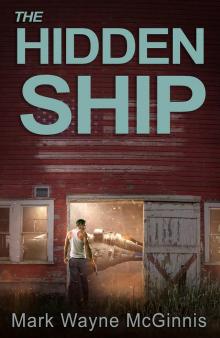 The Hidden Ship
The Hidden Ship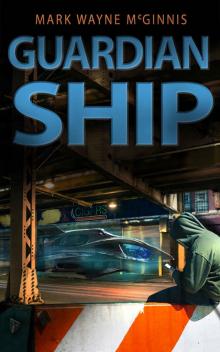 Guardian Ship
Guardian Ship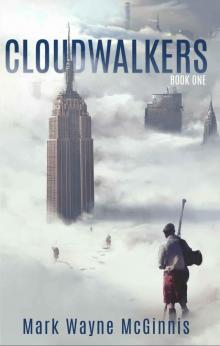 Cloudwalkers
Cloudwalkers Mad Powers (Tapped In)
Mad Powers (Tapped In)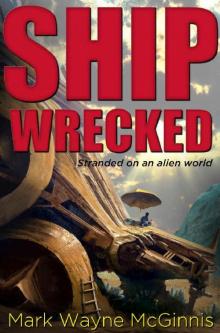 Ship Wrecked
Ship Wrecked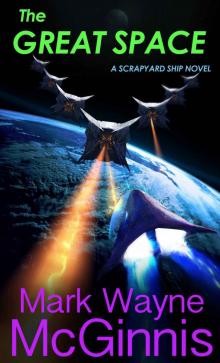 The Great Space (Scrapyard Ship Book 6)
The Great Space (Scrapyard Ship Book 6)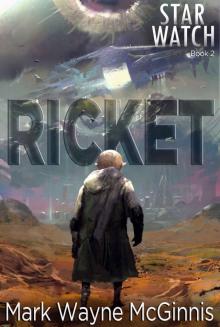 Ricket (Star Watch Book 2)
Ricket (Star Watch Book 2)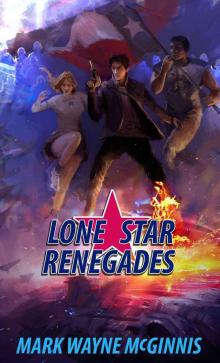 Lone Star Renegades
Lone Star Renegades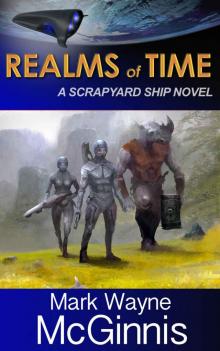 Realms of Time (Scrapyard Ship)
Realms of Time (Scrapyard Ship)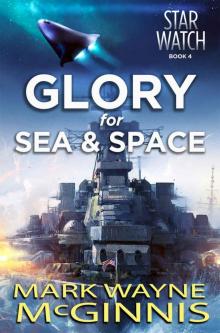 Glory for Sea and Space (Star Watch Book 4)
Glory for Sea and Space (Star Watch Book 4)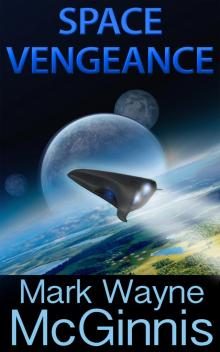 Scrapyard Ship 3 Space Vengeance
Scrapyard Ship 3 Space Vengeance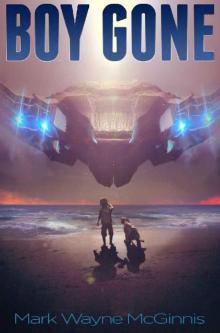 Boy Gone
Boy Gone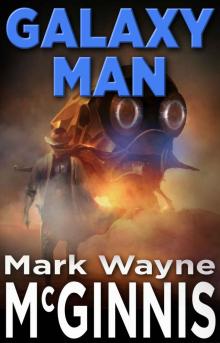 Galaxy Man
Galaxy Man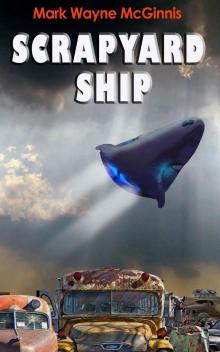 Scrapyard Ship
Scrapyard Ship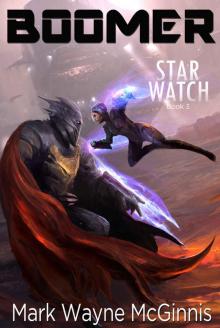 Boomer (Star Watch Book 3)
Boomer (Star Watch Book 3)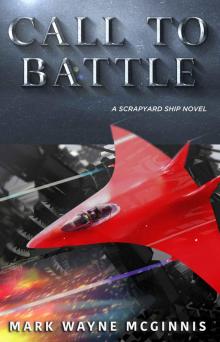 Scrapyard Ship 7: Call to Battle
Scrapyard Ship 7: Call to Battle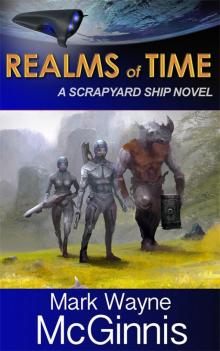 Scrapyard Ship 4 Realms of Time
Scrapyard Ship 4 Realms of Time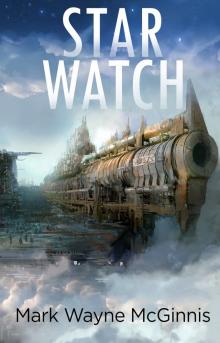 Star Watch
Star Watch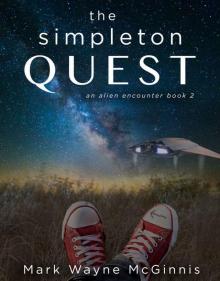 The Simpleton QUEST
The Simpleton QUEST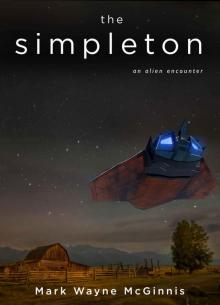 The Simpleton: An Alien Encounter
The Simpleton: An Alien Encounter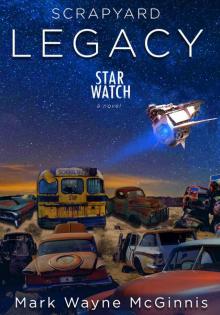 Scrapyard LEGACY (Star Watch Book 6)
Scrapyard LEGACY (Star Watch Book 6)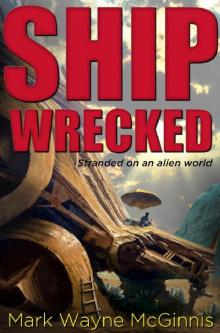 Ship Wrecked: Stranded on an alien world
Ship Wrecked: Stranded on an alien world